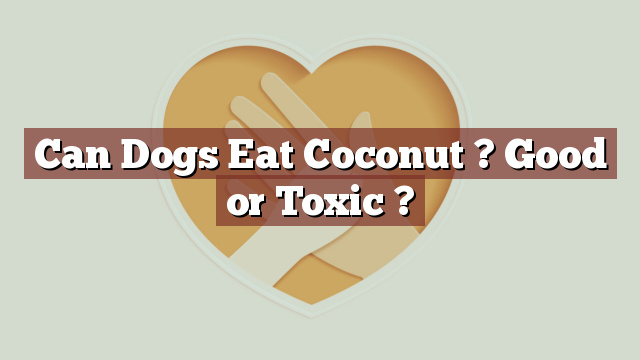Can Dogs Eat Coconut? Good or Toxic?
As pet owners, it is essential to be aware of what foods are safe for our furry friends to consume. While our canine companions often show curiosity about the foods we eat, not all human foods are safe for them. One such food that raises questions is coconut. So, can dogs eat coconut? Let’s find out!
Nutritional Value of Coconut: What Does It Offer?
Coconut is a tropical fruit that is widely known for its unique taste and versatility. It is rich in various nutrients that can be beneficial for human health. Coconut contains healthy fats, dietary fiber, and essential minerals such as manganese, copper, and selenium. Additionally, it offers medium-chain triglycerides (MCTs), which are a type of fatty acids that are easier to digest and provide quick energy.
Can Dogs Eat Coconut? Discover If It’s Safe or Toxic
Dogs can eat coconut in moderation and in the right form. While coconut itself is not toxic to dogs, some precautions should be taken. It is important to remember that dogs have different nutritional needs compared to humans. Therefore, coconut should not be a staple in their diet, but rather an occasional treat.
According to veterinary experts, feeding dogs with small amounts of coconut flesh or coconut oil is generally safe. However, it is crucial to ensure that the coconut is free from any additives or sweeteners, as these can be harmful to dogs. Additionally, the coconut should be served in small, bite-sized pieces to prevent any choking hazards.
Potential Risks or Benefits of Feeding Coconut to Dogs
When given in moderation, coconut can provide certain benefits to dogs. The medium-chain fatty acids found in coconut oil are known to have antimicrobial properties and can help improve digestion and nutrient absorption. Furthermore, coconut oil can promote healthy skin and coat, reducing itchiness and dryness in dogs with skin allergies or irritations.
However, it is important to note that excessive consumption of coconut can lead to gastrointestinal distress in dogs. The high-fat content of coconut can cause diarrhea or an upset stomach, especially if the dog is not accustomed to consuming it. Additionally, coconut meat contains a significant amount of fiber, which, if consumed in excess, can cause digestive issues.
Oops! My Dog Ate Coconut. What Should I Do Next?
If your dog accidentally consumes coconut, there is usually no immediate cause for concern. However, it is recommended to monitor your dog for any signs of gastrointestinal upset, such as vomiting or diarrhea. If these symptoms persist or worsen, it is best to consult your veterinarian for further guidance.
Conclusion: Is Coconut a Good Addition to Your Dog’s Diet?
In conclusion, coconut can be a good addition to your dog’s diet when given in moderation. It can provide certain health benefits, such as improved digestion and a healthier coat. However, it is crucial to serve coconut in small, bite-sized pieces and ensure it is free from additives or sweeteners. If you have any concerns or your dog experiences any adverse reactions after consuming coconut, it is always best to consult with a veterinarian for professional advice tailored to your dog’s specific needs.
Thank you for investing your time in exploring [page_title] on Can-Eat.org. Our goal is to provide readers like you with thorough and reliable information about various dietary topics. Each article, including [page_title], stems from diligent research and a passion for understanding the nuances of our food choices. We believe that knowledge is a vital step towards making informed and healthy decisions. However, while "[page_title]" sheds light on its specific topic, it's crucial to remember that everyone's body reacts differently to foods and dietary changes. What might be beneficial for one person could have different effects on another. Before you consider integrating suggestions or insights from "[page_title]" into your diet, it's always wise to consult with a nutritionist or healthcare professional. Their specialized knowledge ensures that you're making choices best suited to your individual health needs. As you navigate [page_title], be mindful of potential allergies, intolerances, or unique dietary requirements you may have. No singular article can capture the vast diversity of human health, and individualized guidance is invaluable. The content provided in [page_title] serves as a general guide. It is not, by any means, a substitute for personalized medical or nutritional advice. Your health should always be the top priority, and professional guidance is the best path forward. In your journey towards a balanced and nutritious lifestyle, we hope that [page_title] serves as a helpful stepping stone. Remember, informed decisions lead to healthier outcomes. Thank you for trusting Can-Eat.org. Continue exploring, learning, and prioritizing your health. Cheers to a well-informed and healthier future!

